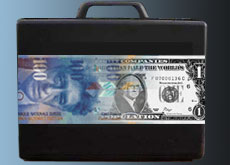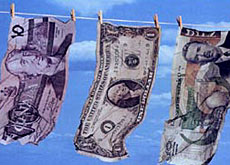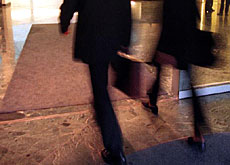Money-laundering investigations rise 57%

Swiss authorities investigated 245 financial institutions last year as part of their efforts to crack down on money laundering.
However, experts still question the effectiveness of new measures which came into force last July.
In a report issued on Friday, the Money Laundering Control Authority said there was a 57 per cent increase in the number of institutions investigated last year.
It said seven financial institutions were told to cease trading. The report said it was a positive sign for Switzerland as a financial centre that only a few operations had been closed down.
In its annual report published on Thursday, the global anti-corruption watchdog, Transparency International, praised Switzerland’s mechanisms for fighting money laundering.
It said the Swiss system, which had been widely criticised in the past, should now serve as a model for other countries.
Gradual progress
Analysts agreed that the figures suggested raised levels of awareness in the financial community and that self-regulation was becoming effective among smaller institutions in the non-banking sector.
“Bit by bit, we are making progress in the fight against money laundering,” Adrian Lobsiger, a specialist in financial crime at Lucerne University, told swissinfo.
He said the will was there and international cooperation had improved, with the Swiss authorities supplying information to countries such as Russia where money laundering was a problem.
But not everyone shares Lobsiger’s confidence.
Basel University’s Mark Pieth, a former member of the Paris-based Financial Action Task Force on Money Laundering, said it was still too early to judge the effectiveness of global anti-money laundering systems.
“There’s a lot of talk about it; there are a lot of rules and we’re trying to create a level playing field,” he said.
“Everybody has to apply similar and similarly expensive rules, but actually to see a relation between the amount of crime and the crime detected is impossible so far.”
Bad faith
Pieth said there were still cases where Swiss financial institutions should have notified the authorities – particularly in regard to politically exposed persons.
“It’s a problem that still hampers the Swiss financial centre and is still not taken seriously enough.”
He cited the example of a bank account belonging to the family of President Dos Santos of Angola which had seen movements of about $400 million (SFr511 million) over a two-year period.
“The Swiss system depends very much on the intelligent cooperation of the financial sector, which is okay if they really comply,” said Pieth. “If there is bad faith, the system breaks down.”
Questions also remain about the relation between the number of cases reported and the effective tracing of crime.
“There’s still a huge gap worldwide between the number of cases reported and convictions,” admitted Lobsiger.
swissinfo, Vincent Landon
Some 245 financial institutions were investigated last year.
That’s a 57% increase over 2002.
Seven financial institutions were told to cease trading.
But analysts have questioned the effectiveness of new regulations.

In compliance with the JTI standards
More: SWI swissinfo.ch certified by the Journalism Trust Initiative



You can find an overview of ongoing debates with our journalists here . Please join us!
If you want to start a conversation about a topic raised in this article or want to report factual errors, email us at english@swissinfo.ch.